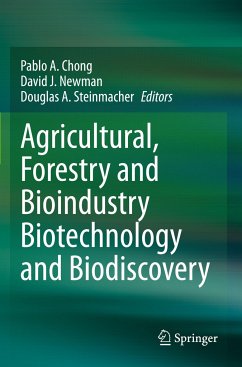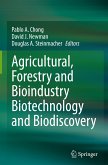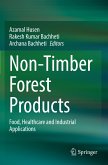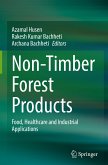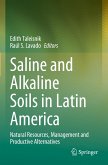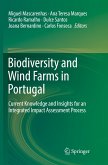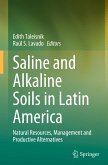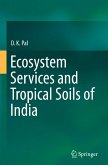Agricultural, Forestry and Bioindustry Biotechnology and Biodiscovery
Herausgegeben:Chong, Pablo A.; Newman, David J.; Steinmacher, Douglas A.
Agricultural, Forestry and Bioindustry Biotechnology and Biodiscovery
Herausgegeben:Chong, Pablo A.; Newman, David J.; Steinmacher, Douglas A.
- Broschiertes Buch
- Merkliste
- Auf die Merkliste
- Bewerten Bewerten
- Teilen
- Produkt teilen
- Produkterinnerung
- Produkterinnerung
Food security, crop protection, biodiversity, and human and environmental health are among the main needs and concerns of society. Modern biotechnology and life sciences represent a constantly evolving area that is key for the rational use of natural resources - resources that in turn are indispensable for societal development. This book features the outcomes of the IV International Biotechnology and Biodiversity Congress, held in Guayaquil, Ecuador, 2018. It includes extensive reviews of the trends in agricultural and forestry biotechnology, molecules and materials biodiscovery,…mehr
Andere Kunden interessierten sich auch für
![Agricultural, Forestry and Bioindustry Biotechnology and Biodiscovery Agricultural, Forestry and Bioindustry Biotechnology and Biodiscovery]() Agricultural, Forestry and Bioindustry Biotechnology and Biodiscovery131,99 €
Agricultural, Forestry and Bioindustry Biotechnology and Biodiscovery131,99 €![Non-Timber Forest Products Non-Timber Forest Products]() Non-Timber Forest Products131,99 €
Non-Timber Forest Products131,99 €![Non-Timber Forest Products Non-Timber Forest Products]() Non-Timber Forest Products131,99 €
Non-Timber Forest Products131,99 €![Saline and Alkaline Soils in Latin America Saline and Alkaline Soils in Latin America]() Saline and Alkaline Soils in Latin America77,99 €
Saline and Alkaline Soils in Latin America77,99 €![Biodiversity and Wind Farms in Portugal Biodiversity and Wind Farms in Portugal]() Biodiversity and Wind Farms in Portugal77,99 €
Biodiversity and Wind Farms in Portugal77,99 €![Saline and Alkaline Soils in Latin America Saline and Alkaline Soils in Latin America]() Saline and Alkaline Soils in Latin America77,99 €
Saline and Alkaline Soils in Latin America77,99 €![Ecosystem Services and Tropical Soils of India Ecosystem Services and Tropical Soils of India]() D. K. PalEcosystem Services and Tropical Soils of India116,99 €
D. K. PalEcosystem Services and Tropical Soils of India116,99 €-
-
-
Food security, crop protection, biodiversity, and human and environmental health are among the main needs and concerns of society. Modern biotechnology and life sciences represent a constantly evolving area that is key for the rational use of natural resources - resources that in turn are indispensable for societal development. This book features the outcomes of the IV International Biotechnology and Biodiversity Congress, held in Guayaquil, Ecuador, 2018. It includes extensive reviews of the trends in agricultural and forestry biotechnology, molecules and materials biodiscovery, ethnomedicine, environmental impact and bioindustry research, describing many of these topics from the Latin America perspective and showing how the biodiversity and ancient knowledge of these countries are vital for worldwide sustainable development.
Produktdetails
- Produktdetails
- Verlag: Springer / Springer International Publishing / Springer, Berlin
- Artikelnr. des Verlages: 978-3-030-51360-3
- 1st edition 2020
- Seitenzahl: 480
- Erscheinungstermin: 30. August 2021
- Englisch
- Abmessung: 235mm x 155mm x 26mm
- Gewicht: 721g
- ISBN-13: 9783030513603
- ISBN-10: 3030513602
- Artikelnr.: 62365581
- Herstellerkennzeichnung Die Herstellerinformationen sind derzeit nicht verfügbar.
- Verlag: Springer / Springer International Publishing / Springer, Berlin
- Artikelnr. des Verlages: 978-3-030-51360-3
- 1st edition 2020
- Seitenzahl: 480
- Erscheinungstermin: 30. August 2021
- Englisch
- Abmessung: 235mm x 155mm x 26mm
- Gewicht: 721g
- ISBN-13: 9783030513603
- ISBN-10: 3030513602
- Artikelnr.: 62365581
- Herstellerkennzeichnung Die Herstellerinformationen sind derzeit nicht verfügbar.
Pablo Chong has a Master's degree in Biotechnology from Escuela Superior Politécnica del Litoral (EPSOL), Ecuador and a PhD degree in Biotechnology from Wageningen University, the Netherlands. He has eighteen years' experience in the field of biotechnology, molecular biology and microbiology. His research focuses on fungi molecular mechanisms to resist systemic fungicides, and his work has led to publications on the discovery of a new resistance mechanism in Pseudocercospora fijiensis. Since 2016, he has worked as an invited Biology Professor at the Life Science Faculty at ESPOL University, and Head Research Coordinator of the molecular biology and plant tissue culture departments at CIBE-ESPOL. David Newman has an analytical chemistry (ARIC) background. He holds an MSc in Synthetic Organic Chemistry and a doctorate in Microbial Chemistry. His career spans over 50 years: he spent 25 years working on the search for novel antibiotics (bothantibacterial and antifungal) in the US pharmaceutical industry. The other 25 years were spent working at the US National Cancer Institute, where he was initially responsible for microbial and marine collection programs looking for leads to antitumor drugs. During this time, he was also responsible for the sourcing of pure halichondrin B, an agent from a deep-water sponge, and he received the NIH Award of Merit for his research leading to the successful introduction of Halaven®. Douglas André Steinmacher, PhD, has twenty years' experience in the field of plant tissue culture, especially somatic embryogenesis. He is an agronomist (2002) with an MSc in Plant Genetic Resources from the Federal University of Santa Catarina (UFSC - 2005) and a PhD in Applied Botany from the University of Hamburg, Germany (2010). He was a member of the board of directors of the Germany Society for Plant Tissue Culture (ADIVK) (2009-2010), and since 2014 has been head of the VivetechAgrosciences company. His interests include plant micropropagation, somatic embryogenesis, plant bioreactors, temporary immersion systems, plant somaclonal variation and plant physiology.
Genetically modified organisms (GMOs) impact and current status in Latin America: technological sovereignty or dependence?.- New biotechnology promising approaches for disease control on bananas and plantains.- Complementation of bananas conventional breeding programs through biotechnological genetic improvement.- The stress as inducer of heritable changes in micropropagated banana: the hypothesis of cytokinin accumulation.- Somatic embryogenesis for clonal propagation and associated molecular studies in cacao (Theobroma cacao L.).- Use of biotechnology in Forestry breeding programs for natural resources and biodiversity conservation; Creating super trees for the future.- Stress modulation in Pinus spp. Somatic embryogenesis as model for climate change mitigation; Stress is not always a problem.- A Protective Role for Accumulated Dry Matter Reserves in Seeds During Desiccation: Implications for Conservation.- Biodiversity in Ecuador and its immense potential for agricultural pest control.- Native biodiversity: a strategic resource to accelerate bioeconomy development in Latin America and the Caribbean.- Low cost crop waste biosorbent technology for removing toxic and pollutants from wastewater.- The status of plant and plant-microbe interactions related to medicinal agents.- Bringing new function to packaging materials by agricultural byproducts.- Use of banana crop wastes to develop products in the aquaculture and plastic sectors.- Use of agroindustrial biomass for biofuels, enzymes discovery and production.- Temperature Profiles during the Fermentation of Cacao 'Nacional' to understand chocolate quality .- Ethno Phytopharmacology. Product validation process based on traditional knowledge of medicinal plants.- Biological control as a key tool for the management of invasive species in Latin America and the Caribbean.- Current research on Andean fruit crop diseases.- Biotechnological tools for the development of Foc TR4-resistant or tolerant Musa spp. Cultivars.- Integrated pest management of whitefly crop-free periods can reduce the Begomovirus transmission in tomato
Genetically modified organisms (GMOs) impact and current status in Latin America: technological sovereignty or dependence?.- New biotechnology promising approaches for disease control on bananas and plantains.- Complementation of bananas conventional breeding programs through biotechnological genetic improvement.- The stress as inducer of heritable changes in micropropagated banana: the hypothesis of cytokinin accumulation.- Somatic embryogenesis for clonal propagation and associated molecular studies in cacao (Theobroma cacao L.).- Use of biotechnology in Forestry breeding programs for natural resources and biodiversity conservation; Creating super trees for the future.- Stress modulation in Pinus spp. Somatic embryogenesis as model for climate change mitigation; Stress is not always a problem.- A Protective Role for Accumulated Dry Matter Reserves in Seeds During Desiccation: Implications for Conservation.- Biodiversity in Ecuador and its immense potential for agricultural pest control.- Native biodiversity: a strategic resource to accelerate bioeconomy development in Latin America and the Caribbean.- Low cost crop waste biosorbent technology for removing toxic and pollutants from wastewater.- The status of plant and plant-microbe interactions related to medicinal agents.- Bringing new function to packaging materials by agricultural byproducts.- Use of banana crop wastes to develop products in the aquaculture and plastic sectors.- Use of agroindustrial biomass for biofuels, enzymes discovery and production.- Temperature Profiles during the Fermentation of Cacao 'Nacional' to understand chocolate quality .- Ethno Phytopharmacology. Product validation process based on traditional knowledge of medicinal plants.- Biological control as a key tool for the management of invasive species in Latin America and the Caribbean.- Current research on Andean fruit crop diseases.- Biotechnological tools for the development of Foc TR4-resistant or tolerant Musa spp. Cultivars.- Integrated pest management of whitefly crop-free periods can reduce the Begomovirus transmission in tomato

